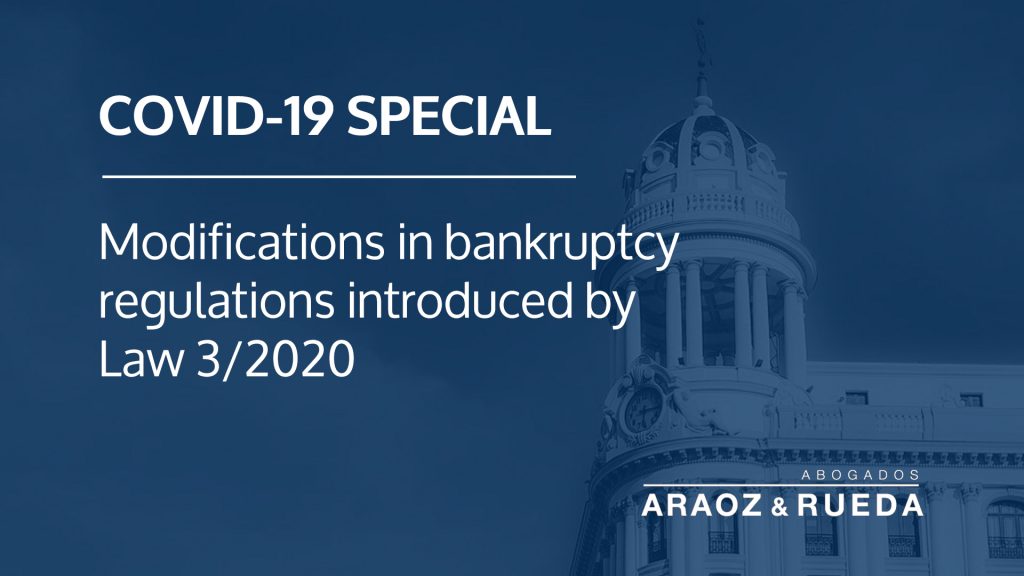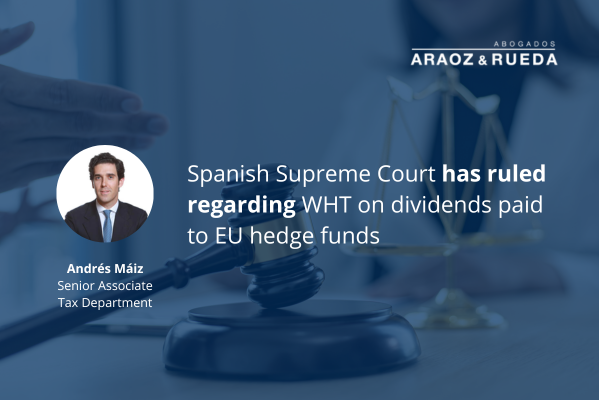Following the declaration of the state of alarm on 14 March 2020, a series of economic and social measures were adopted to tackle the health crisis resulting from the COVID through the adoption of various royal decrees-laws, which reached several areas, including bankruptcy.
In this context, Royal Decree Law 16/2020, of 28 April, on procedural and organizational measures relating to COVID-19 in the field of the Administration of Justice (“RDL 16/2020“) was approved. This Royal Decree-Law had a direct impact on the field of insolvency proceedings, with measures that, among other things, focused on making the situation of debtors in compliance with an approved composition or refinancing agreement more flexible.
Once the state of alarm was expired, the Law 3/2020, of September 18, on procedural and organizational measures to address the COVID-19 in the field of the Administration of Justice (the “Law 3/2020“) was published last 19 September. The Law 3/2020 derogates the RDL 16/2020, adapting and enhancing the measures provided therein to the current health situation, and extending in some cases the deadlines for its implementation, with the hope that at the expiration of these new deadlines there will be all the health guarantees against COVID-19.
Law 3/2020 dedicates its second Chapter to developing the measures adopted in the field of bankruptcy and corporate law, which, as we will now explain, largely follow the same line of action as those initially envisaged in RDL 16/2020.
- Modification of the insolvency composition
In accordance with Article 3 of Law 3/2020, the insolvent debtor may present, up to 14 March 2021 inclusive, a proposal for the modification of the insolvency composition that is in compliance. It should be noted, in this respect, that this was a measure already provided for by RDL 16/2020, although its wording has been amended. It now expressly sets “until 14 March 2021 inclusive” as the time limit for its application.
The proposal for modification will follow the same rules as those foreseen for the approval of the original composition, although in any case it will require written proceeding. In addition, the amendment will not affect the credits accrued or contracted during the period of compliance with the original composition or the privileged creditors, unless the later vote in favor of or expressly adhere to the amendment proposal.
The same Article establishes that the judge will notify the insolvent debtor of all the requests for declaration of bankruptcy submitted by the creditors until 31 October 2020 inclusive. However, the judge will not admit such requests until three months have passed from 31 October 2020. The wording of this measure is similar to the one provided by RDL 16/2020, although the time period initially provided by the Royal Decree Law was six months from the declaration of the state of alarm (i.e., until 14 September 2020) and Law 3/2020 extends it until 31 October of the same year.
- Postponement of the duty to declare the opening of the winding-up phase (fase de liquidación)
Article 4 of Law 3/2020 defers, until 14 March 2021 inclusive, the debtor’s duty to request the liquidation of the aggregate assets (masa activa), provided that a proposal to modify the agreement is submitted and admitted within the same term.
Furthermore, also during the same period, it is established that the judge will not issue an order opening the winding-up phase (fase de liquidación), even if the creditor proves the existence of one of the events that would support the declaration of bankruptcy.
Finally, Article 4.3 of Law 3/2020 provides that, until 14 March 2022, credits derived from treasury revenues for loans, credits or other businesses of a similar nature that have been granted to the insolvent debtor will be considered as credits against the aggregate assets (créditos contra la masa).
The same consideration will apply to those credits derived from personal or real guarantees constituted in favor of the insolvent debtor by any person, including those who, according to the law, have the status of persons especially related to the insolvent debtor (provided that the agreement or the amendment states the identity of the obligor and the maximum amount of the financing to be granted or the guarantee to be constituted).
Once again, we must emphasize that this set of measures was already provided for in RDL 16/2020, so that Law 3/2020 only amends the references to the “declaration of the state of alarm“, expressly setting 14 March 2020 as the dies a quo for the stipulated deadlines.
- Refinancing agreements
Concerning refinancing agreements, Law 3/2020 establishes that until 14 March 2021, inclusive, the debtor who has an approved refinancing agreement may modify it or reach a new one, even if a year has not passed since the previous approval.
In addition, until 31 October 2020 inclusive, the judge will process the debtor’s declarations of noncompliance with the refinancing agreement submitted by the creditors, but will not admit them until one month after this date.
- Special regime for the application for the declaration of the insolvency proceedings
As already provided in RDL 16/2020, Law 3/2020 establishes that the debtor who is in a state of insolvency will not have the duty to request the declaration of the insolvency proceedings until 31 December 2020 (inclusive).
Within the same period, the judges will:
- not admit for consideration the applications for the necessary composition that have been submitted since 14 March 2021 and,
- admit for consideration on a preferential basis the applications for voluntary composition.
Finally, if up to and including 31 December 2020, the debtor has notified the opening of negotiations with creditors, it will not have the duty to request the insolvency proceeding until six months have passed since the communication of said negotiations.
- Disposal of the aggregate assets (masa activa) and challenge of the inventory and the list of creditors
Another of the amendments introduced by Law 3/2020 is the possibility, in auctions declared until 14 March 2021 (or those in process at the time the Law comes into force), that the auction of assets and rights of the aggregate assets (masa activa) be carried out both by auction, judicial or extrajudicial, as well as by any other means of execution authorized by the judge from among those provided for in the Restated Bankruptcy Law. In this regard, the reference made by the RDL 16/2016 to the former Bankruptcy Law, now derogated, is therefore amended.
In addition, and given the health crisis, the auction should preferably be conducted remotely. The spirit of this measure is also followed concerning the challenge of the inventory and the list of creditors. In this regard, Article 8 of Law 3/2020 establishes that in the incidents that are initiated to settle these issues it will not be necessary to hold the hearing, unless the judge of the insolvency proceedings considers it necessary.
Thus, the lack of response to the claim by any of the defendants will be considered an acceptance of the claim (except those creditors considered to be of public law), and the means of evidence must necessarily be accompanied by the incidental claim of challenge and the responses that are presented.
- Suspension of the cause of dissolution due to losses
As already stated in RDL 16/2020, Article 13 of Law 3/2020 determines that the losses incurred in the year 2020 will not be taken into account to determine the concurrence of the cause for dissolution provided for in Article 363.1.e) of the Spanish Corporate Act (Ley de Sociedades de Capital).
This set of measures, particularly the new special regime for applying for a declaration of bankruptcy, as well as the suspension of the cause for dissolution due to losses during the financial year 2020, is aimed at allowing companies to gain time to restructure their debt, obtain liquidity and compensate losses.
Therefore, it is a matter of preserving the business fabric and the jobs composed of those companies that, under general market conditions, are expected to be viable. In short, the Law 3/2020 is aimed at temporarily and exceptionally mitigate the consequences that the application of the general rules on the dissolution of capital companies and on the declaration of bankruptcy would have in the current situation.





